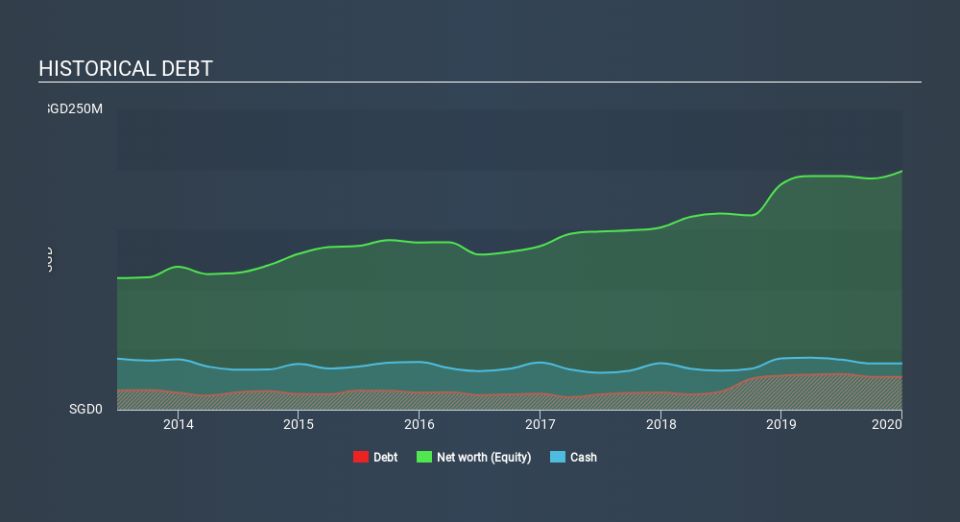Does ISDN Holdings (SGX:I07) Have A Healthy Balance Sheet?

Some say volatility, rather than debt, is the best way to think about risk as an investor, but Warren Buffett famously said that 'Volatility is far from synonymous with risk'. So it seems the smart money knows that debt - which is usually involved in bankruptcies - is a very important factor, when you assess how risky a company is. We note that ISDN Holdings Limited (SGX:I07) does have debt on its balance sheet. But the real question is whether this debt is making the company risky.
What Risk Does Debt Bring?
Debt and other liabilities become risky for a business when it cannot easily fulfill those obligations, either with free cash flow or by raising capital at an attractive price. Ultimately, if the company can't fulfill its legal obligations to repay debt, shareholders could walk away with nothing. However, a more common (but still painful) scenario is that it has to raise new equity capital at a low price, thus permanently diluting shareholders. Having said that, the most common situation is where a company manages its debt reasonably well - and to its own advantage. When we examine debt levels, we first consider both cash and debt levels, together.
See our latest analysis for ISDN Holdings
How Much Debt Does ISDN Holdings Carry?
The chart below, which you can click on for greater detail, shows that ISDN Holdings had S$27.3m in debt in December 2019; about the same as the year before. However, it does have S$38.6m in cash offsetting this, leading to net cash of S$11.3m.
A Look At ISDN Holdings's Liabilities
According to the last reported balance sheet, ISDN Holdings had liabilities of S$94.1m due within 12 months, and liabilities of S$9.06m due beyond 12 months. Offsetting this, it had S$38.6m in cash and S$92.0m in receivables that were due within 12 months. So it actually has S$27.3m more liquid assets than total liabilities.
This surplus strongly suggests that ISDN Holdings has a rock-solid balance sheet (and the debt is of no concern whatsoever). On this basis we think its balance sheet is strong like a sleek panther or even a proud lion. Succinctly put, ISDN Holdings boasts net cash, so it's fair to say it does not have a heavy debt load!
But the bad news is that ISDN Holdings has seen its EBIT plunge 13% in the last twelve months. If that rate of decline in earnings continues, the company could find itself in a tight spot. There's no doubt that we learn most about debt from the balance sheet. But ultimately the future profitability of the business will decide if ISDN Holdings can strengthen its balance sheet over time. So if you want to see what the professionals think, you might find this free report on analyst profit forecasts to be interesting.
Finally, while the tax-man may adore accounting profits, lenders only accept cold hard cash. ISDN Holdings may have net cash on the balance sheet, but it is still interesting to look at how well the business converts its earnings before interest and tax (EBIT) to free cash flow, because that will influence both its need for, and its capacity to manage debt. In the last three years, ISDN Holdings's free cash flow amounted to 25% of its EBIT, less than we'd expect. That's not great, when it comes to paying down debt.
Summing up
While it is always sensible to investigate a company's debt, in this case ISDN Holdings has S$11.3m in net cash and a decent-looking balance sheet. So we don't have any problem with ISDN Holdings's use of debt. There's no doubt that we learn most about debt from the balance sheet. But ultimately, every company can contain risks that exist outside of the balance sheet. Take risks, for example - ISDN Holdings has 4 warning signs we think you should be aware of.
When all is said and done, sometimes its easier to focus on companies that don't even need debt. Readers can access a list of growth stocks with zero net debt 100% free, right now.
If you spot an error that warrants correction, please contact the editor at editorial-team@simplywallst.com. This article by Simply Wall St is general in nature. It does not constitute a recommendation to buy or sell any stock, and does not take account of your objectives, or your financial situation. Simply Wall St has no position in the stocks mentioned.
We aim to bring you long-term focused research analysis driven by fundamental data. Note that our analysis may not factor in the latest price-sensitive company announcements or qualitative material. Thank you for reading.

